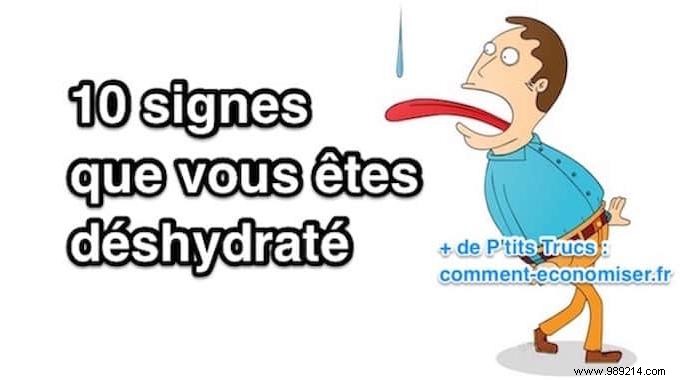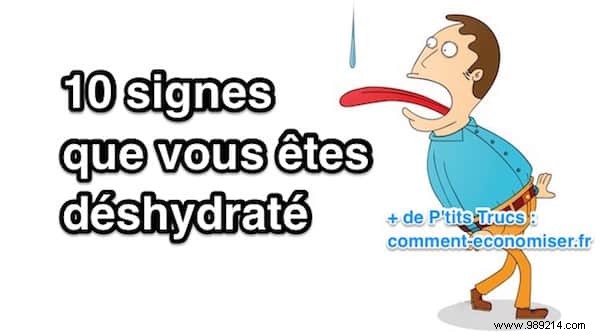
Research shows that 62.2% of children experience hydration deficits. For some kids and teens, water isn't part of their daily fluid intake at all.
Many adults fare no better – 76% of French people fall short of recommended daily water intake.
Not drinking enough water can lead to serious issues like digestive problems, anxiety, and chronic fatigue.

Water makes up about 60% of our body, 75% of our muscles, and 85% of our brain. This underscores why dehydration demands our attention.
It disrupts key bodily functions, causing lethargy, nausea, and even depression-like symptoms.
The good news? Recognizing the signs early lets you prevent complications. Here are 10 key indicators of dehydration, drawn from clinical observations and studies:
Dry skin is a hallmark of dehydration. Without adequate water, your body struggles to flush toxins, leading to clogged pores and breakouts.
Trouble producing tears? That's another clue. A parched mouth signals your brain's thirst alarm, often felt elsewhere too.
Tip: Combat dry skin with these 6 effective home remedies.
This is your body's clear alert for more water. Low output means toxins accumulate, straining kidneys that rely on hydration.
Aim for bathroom visits several times daily. Pale urine signals good hydration; dark yellow or brown means drink up – try 1-2 glasses before bed.
Cartilage is 80% water, acting as a lubricant for joints. Post-exercise rehydration is crucial; dehydration heightens injury risk.
Back pain may signal kidney strain from low fluids. Increase intake if aches persist.
Tip: Discover 20 natural painkillers in your kitchen.
Water delivers oxygen to cells. Dehydration forces your body to pull from blood reserves, slowing functions and sparking exhaustion, irritability, and burnout.
Tip: Try these 10 proven anti-fatigue strategies.

Thirst can mimic hunger – both signals overlap in the brain. Next time, sip water first. If hunger fades, dehydration was the culprit.
Tip: Make the easiest, most satisfying salad.
Dehydration thickens blood, slows circulation, and raises sodium – all fueling hypertension and related risks.
Tip: 5 superfoods to help lower blood pressure.
Your body conserves water during dehydration. A study of 15 fasters showed those without hydration had markedly higher cholesterol than those with water and salt.
Sugary drinks over water mimic this effect daily.
Tip: 7 natural remedies to lower cholesterol.
Water transports nutrients and waste, detoxifying your system. Dehydration slows colon transit, causing constipation, reflux, and ulcers as the gut pulls moisture from food.
Tip: 11 natural remedies for constipation.
Hydration detoxifies skin too. Toxin buildup from dehydration triggers acne, eczema, psoriasis, and pigmentation issues.
Tip: 17 benefits of castor oil for skin, hair, and health.
Brain tissue shrinks without water, tugging on skull membranes and triggering pain. Reduced blood volume means less oxygen, dilating vessels and causing inflammation.
Tip: 11 proven natural headache remedies.
Stay healthy with at least 1.5 liters of water daily. Busy days make it easy to forget – label two 500ml bottles with drink times. See the full trick here.